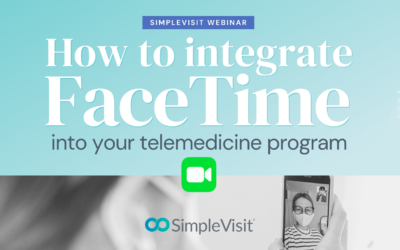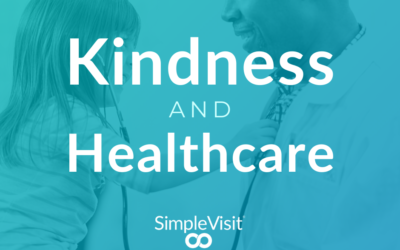Using FaceTime for Telemedicine in 2021
Rob Warlick | 4 min read | January 26, 2021
In response to the global pandemic and the public health emergency, many medical groups have purchased or crafted a solution to treat over video. Due to the lax in federal regulations, many are turning to commonly available video calling applications for convenience and comfort. Outside of this public health emergency, HIPAA and HITECH rules would penalize these care delivery methods. It is important to understand the implications and options for your practice as we navigate past the pandemic response.
SimpleVisit has been able to leverage FaceTime and other video calling apps in a HIPAA-compliant way prior to the pandemic and is expected to be the only way to do so once the pandemic ends.
In this session we cover the current state of affairs and policy notes stated and expected for 2021… we answer the question “How can FaceTime be HIPAA compliant?” and share how other practices are working to set up their telemedicine programs for long-term success.
Highlights
Using FaceTime for Telemedicine
- Many practices are addressing access and usability challenges for telemedicine by using common video platforms like FaceTime, Skype, and Google Duo.
- SimpleVisit telemedicine service able to bridge any-to-any video platform (i.e. FaceTime to Zoom) so your staff has a consistent experience for every visit.
Understanding HIPAA and HITECH
- Facetime, apart from SimpleVisit’s bridging capability, is not advised for telemedicine.
- HIPAA and HITECH aim to protect electronic private health information.
- Any vendor used must have 1) End-to-end encrypted solution. 2) Business associates agreement.
During the National Emergency
- No enforcement of privacy restrictions during state of emergency
- Policy Changes mainly centered around reimbursement not lax privacy / security protections.
- Covered health care providers will not be subject to penalties for violations of the HIPAA Privacy, Security, and Breach Notification Rules that occur in the good faith provision of telehealth during the COVID-19 nationwide public health emergency. This Notification does not affect the application of the HIPAA Rules to other areas of health care outside of telehealth during the emergency.
What to Expect in the Future
- The Notification of Enforcement Discretion does not have an expiration date. OCR will issue a notice to the public when it is no longer exercising its enforcement discretion based upon the latest facts and circumstances.
- The public health emergency surrounding the COVID-19 pandemic was set to expire the day after President-elect Joe Biden takes the oath of office, but the Department of Health and Human Services has extended the emergency declaration for another 90 days. The extension is effective January 21 and extends to April 21.
- Most changes made to federal, state and private entities involved in reimbursement for and regulation of telehealth services are only for the duration of the PHE. When that expires, which is likely to be once the vaccine has been fully rolled out in all states or infection and death rates are sufficiently reduced, some or all will revert to their previous states.
Where to From Here
- Practices who will continue to offer a telemedicine option are migrating to a more official solution that offers HIPAA compliance.
- SimpleVisit allows for continual use of Facetime in a HIPAA compliant manner.
How to Integrate FaceTime for Telemedicine
Rob Warlick | 3 min read | April 23, 2021During the public health emergency, direct FaceTime calls are permitted for healthcare. Outside of that waiver, SimpleVisit is the only HIPAA-compliant way to bridge in FaceTime and other video calling apps. With over 620...
Kindness and Healthcare
Allie Clark | 10 min read | December 2, 2020It is time for some kindness. The holiday season can be a rough time for many among us. A report from the National Alliance on Mental Illness shows that this time of the year negatively affects a majority of people suffering...
How to Talk to Seniors (About Telemedicine)
Allie Clark | 10 min read | November 13, 2020In the midst of an unprecedented healthcare crisis, it’s important to be mindful of some of the most vulnerable members in our communities: our seniors. This particular season has been uniquely challenging for older...



